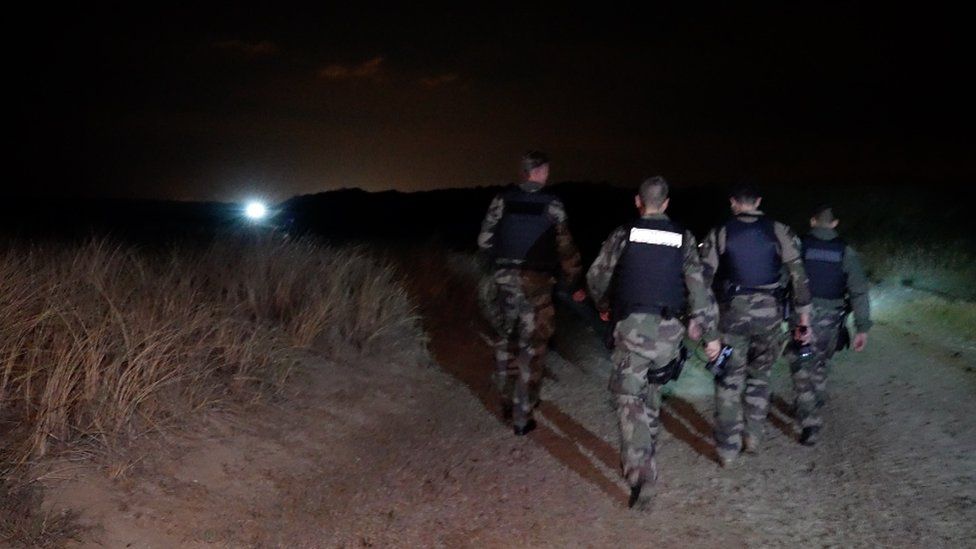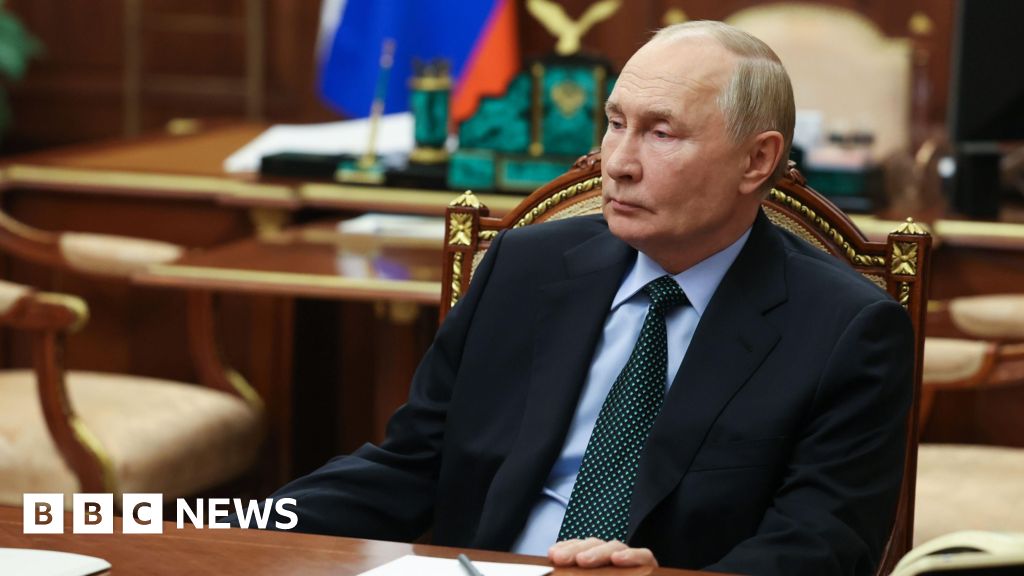ARTICLE AD BOX

Despite more and more resources from the UK and France, police in Calais are struggling to stop Channel crossings
By Lucy Williamson
BBC News, Calais
Hidden in dense vegetation along the coast north of Calais, two men are quietly piling the pressure on Britain's new prime minister.
Crouching in the darkness, they swiftly prepare a boat to take migrants across the Channel.
High above them in the pre-dawn gloom, the approaching buzz of a UK-funded drone signals the start of a familiar chase.
Less than a kilometre away, French gendarmes scrutinise the two figures on the drone's thermal camera; their images a riot of pink and orange.
Within seconds the unit have piled into a special buggy, also provided by the UK, and are bouncing across the sandy scrubland towards the site.
It takes less than five minutes to get there, but the last 50 metres must be covered on foot through thick, spiky vegetation, some of it chest-high.
The two men flee as the unit approaches, leaving behind them the half-prepared boat, the fuel and motor, and two sacks of life-jackets.
"The vegetation works against us," General Frantz Tavart told me. "The smugglers know this and stash the boats here on purpose."
BBC
We have five minutes to intervene between the moment they inflate the boat and the moment they put it in the sea, otherwise it's over.
The UK drones are valuable, he says, because they spot even well-hidden sites like this one.
"The drone caught this," he said. "The [surveillance] plane passed over beforehand and didn't spot it, because it was hidden by the trees."
This 160km stretch of coastline has sucked in resources, year after year. France and the UK have invested in more patrols, better technology and different kinds of vehicles. And still the numbers crossing the Channel keep growing.
French patrols say they're stopping around half of all crossing attempts, but more than 30,000 people have still made it to the UK so far this year.
And it's not just migrants who are finding this route increasingly attractive. New smuggling networks have been reported this summer too.
A senior French official with good knowledge of the situation told us that dedicated Albanian smuggling networks are now operating across the Channel, separately from the main Kurdish and Iraqi networks.
"[The Albanian networks] are more efficient than the others," he told us. "40% of those we intercept on this side of the Channel are Albanian; but they make up 60% of those who arrive on the other side."
"Our hypothesis is that they're a lot more experienced than the others in terms of criminal activity, and more used to organising themselves and avoiding the police. We find the prices are higher for Albanian networks than for the others."
General Tavart says he can't confirm whether the new Albanian smuggling routes are being run by established criminal groups, perhaps based in the UK, but he says it would make sense.
"With the price of a crossing around 4,000 euros (£3,482), and around 40 people in one boat, do the maths," he said. "It's extremely lucrative, even more so than drug trafficking, and the criminal charges are lighter."
French patrols say they are stopping around half of all crossing attempts from Calais
Some have suggested that shortages in the labour market post-Brexit are adding to the 'pull-factors' attracting both smugglers and their clients.
Larger numbers of Albanians have been seen at the main migrant camp in Dunkerque, but most seem to stay in hotels around the area, or in Paris or Brussels.
At one hotel in Dunkerque, the landlady confirmed she now had a large number of Albanian clients passing through.
The owner of a bar across the street from the station said that on some days half his customers are Albanian.
"I wonder if there's anyone left in Albania," he said, "seeing how many of them are coming through here."
The rise in migrants crossing the Channel, and the appearance of new smuggling networks, seems to challenge the government's strategy of deterrence.
For months, the UK government has been promising to send some of those who arrive in small boats to Rwanda, where their asylum claims will be processed, and where they will be expected to settle if their claim is successful.
On the road outside Calais, in the small hours of the morning, we met 17-year-old Sikunder and his friends, wrapped in survival blankets that glinted like pieces of silver in the dark.
They are all from Afghanistan, they said, and had just been rescued from a sinking boat by the French police.
The group had just been pulled out of the sea by French police
I asked Sikunder whether he was aware that the UK might send him to Rwanda.
"I have heard about it," he replied, "but some of my relatives in the UK told us the plan was finished, and we can come to the UK."
It was his second attempt at crossing; he's determined it won't be his last.
The UK government is currently fighting a court battle over the legality of its Rwanda policy. In the camps around Calais, almost everyone is aware of the risk, and almost everyone finds a way to rationalise it away.
Biniam is a softly-spoken 28-year-old man from the Tigray region in Ethiopia. In fluent English, he told me he had a Masters degree in manufacturing, and that he wanted to claim asylum in the UK because he had seen how the British government had spoken out strongly against the violent conflict in Tigray.
"The UK understands the situation in my country," he told me. "So that's why I will go."
I ask him how afraid he is of being sent to Rwanda.
"100% afraid," he said. "If they return me to Africa, it will be easy for the government of Ethiopia to take me."
The UK's government's stance on the conflict in Tigray convinced Biniam to seek asylum in the UK
More than one person here told me how the change of prime minister would mean the policy would be scrapped.
There's little sign of that UK Prime Minister Liz Truss has so far been very supportive of it.
Jess Sharman of Care4Calais says people are risking their lives to get to the UK, because they can't claim asylum while in France, and can't cross the Channel via official routes.
"They shouldn't be here, and it's only because of government policies that they are," she said. "And that could change overnight if Liz Truss could make it safe and legal for them to [claim asylum]."
A lot can change overnight here in Calais.
Camps are systematically destroyed by police units; violent conflicts erupt between smuggling gangs; security patrols race migrants for miles along the scrubby coastline; and - very often - as dawn breaks, another boatload of people from around the world end up on Britain's shores.

 2 years ago
42
2 years ago
42








 English (US)
English (US)